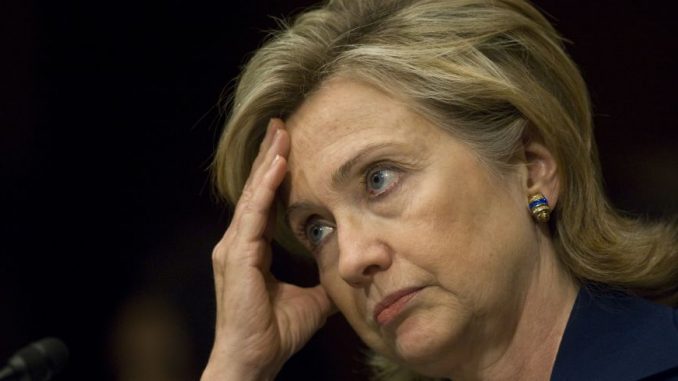
Hillary Clinton has been forced to answer questions under penalty of perjury around her use of a private email server whilst serving as Secretary of State.
A federal judge ordered Hillary to answer twenty-five questions submitted by Judicial Watch on August 30 concerning her email practises.

BYPASS THE CENSORS
Sign up to get unfiltered news delivered straight to your inbox.
You can unsubscribe any time. By subscribing you agree to our Terms of Use
Latest Video
Clinton said 20 times that she “did not recall” the information being asked of her in the questions, whilst asserting that nobody had warned her that what she did was illegal.
Politico.com reports:
“Secretary Clinton states that she does not recall being advised, cautioned, or warned, she does not recall that it was ever suggested to her, and she does not recall participating in any communication, conversation, or meeting in which it was discussed that her use of a clintonemail.com e-mail account to conduct official State Department business conflicted with or violated federal recordkeeping laws,” lawyers for Clinton wrote.
Clinton also said she could not recall ever being warned about any hacking or attempted hacking of her private account or server.
Clinton signed the legal filing Monday “under penalty of perjury.” The submission was ordered by a federal judge in connection with a Freedom of Information Action lawsuit filed by the conservative group Judicial Watch.
Lawyers for the group asked for a live deposition where they could question Clinton in person, but U.S. District Court Judge Emmet Sullivan instead ordered Clinton to answer written questions.
Clinton’s answers generally track with her public statements on the issue and with FBI reports about what she said during an interview conducted in July.
Clinton “decided to use a clintonemail.com account for the purpose of convenience,” her lawyers said. Asked what other reasons she may have had for doing so, she gave no ground.
“Secretary Clinton states that she does not recall considering factors other than convenience in deciding to use a personal e-mail account to conduct official State Department business,” the attorneys said.
Republicans have charged that Clinton used the private set-up in order to evade Freedom of Information Act requests, but the Democratic presidential nominee and former secretary of state said she doesn’t recall that issue ever coming up when she was at the State Department.
“Secretary Clinton does not recall whether she had a specific expectation that the State Department would receive FOIA requests for or concerning her e-mail. She understood that, because her practice was to e-mail State Department staff on their state.gov accounts, her email was being captured in the State Department’s recordkeeping systems….Secretary Clinton understood that e-mail she sent or received in the course of conducting official State Department business was subject to FOIA,” the lawyers wrote.
Whatever Clinton’s expectations, the State Department was not automatically archiving all emails sent to official accounts. State’s inspector general concluded that the method Clinton relied on was “not an appropriate method of preserving emails that constitute Federal records.”
Asked about a November 2010 discussion of Clinton getting an official email account or State Department BlackBerry, Clinton said the issue at the time wasn’t triggered by anything related to her email, but by problems getting informed about phone calls in a timely way. She acknowledged, however, that she did not want State Department officials seeing her personal messages.
“When Secretary Clinton wrote, ‘This is not a good system,’ she was referring to the way in which the State Department would notify her of telephone calls. Secretary Clinton does not recall what precisely she meant by the words ‘address’ or ‘device,'” the attorneys wrote.
“To the best of her recollection, she meant that she was willing to use a State Department e-mail account or device if it would resolve the problems with receiving telephone calls, so long as her personal e-mails with family and friends would not be accessible to the State Department. Following this e-mail exchange, the State Department changed the way in which it notified Secretary Clinton of telephone calls, resolving the problem that triggered this e-mail,” the lawyers added.
One of the questions put to Clinton sought to explore her public statement that “it was recommended” to her to use a private email account while she was secretary. Clinton’s official answer indicated she was referring to comments former Secretary of State Colin Powell made to her as she was taking office.
“Secretary Clinton states that former Secretary of State Colin Powell advised her in 2009 about his use of a personal e-mail account to conduct official State Department business,” Clinton’s lawyers wrote.
Clinton declined to provide any answer to two of the 25 questions Judicial Watch asked. Her lawyers said she was declining to answer a question about the dangers of using a BlackBerry not approved for classified information because the query went beyond the topics approved by the judge.
The former secretary also passed on a question about why she testified that 90 to 95 percent of her emails were in State Department systems. Her lawyers said the answer called for information protected by attorney-client privilege.
Clinton spokesman Brian Fallon said there were no new revelations in the answers and criticized Judicial Watch for pressing the FOIA lawsuit. “Secretary Clinton has answered these same questions in multiple settings for over a year, and her answers here are entirely consistent with what she has said many times before,” Fallon said. “Judicial Watch is a right-wing organization that has been attacking the Clintons since the 1990s, and this frivolous lawsuit is just its latest failed attempt to hurt her campaign for the Presidency.”
https://www.youtube.com/watch?v=fYhpIotTMGI


